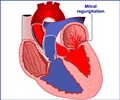A recent study concluded that outcomes following the use of sildenafil are worse in patients with residual pulmonary hypertension following heart valve surgery.
- Sildenafil has been approved for the treatment of pulmonary arterial hypertension since it relaxes the lung blood vessels
- It is being used off-label for the treatment of residual pulmonary hypertension following heart valve surgery
- Scientists now suggest that such use can worsen outcomes in patients
treatment of angina).
TOP INSIGHT
Sildenafil should not be used in patients with residual pulmonary hypertension following surgery on heart valves.
A high pressure in these arteries means that the heart has to pump against greater resistance, and the work load of the heart is increased. The patient may suffer from shortness of breath, chest pain and swelling of the ankles and feet. If left untreated, eventually, the patient could suffer from heart failure. Sildenafil relaxes the smooth muscles of the pulmonary blood vessels thereby reducing the vascular resistance. Thus, it improves exercise tolerance and delays clinical worsening.
Scientists have now warned against the use of sildenafil in treating residual hypertension in patient with valvular heart disease. The heart valves are responsible for the unidirectional flow of blood. Diseases of the heart valves can either result in narrowing of the openings in the heart valves (stenosis), or backflow of the blood (regurgitation). Severe heart valve disease is treated surgically, through repair or replacement or dilatation of the valve.
Patients who suffer from pulmonary hypertension before heart valve surgery often continue to experience residual hypertension after the surgery as well. The pulmonary hypertension can result in disability and even death.
The Sildenafil for Secondary Pulmonary Hypertension Due to Valvular Disease (SIOVAC) conducted a study in 200 patients who had heart valve surgery at least a year before they were included in the study. The patients received either sildenafil in a dose of 40 mg three times a day (104 patients) or placebo (96 patients) for a duration of 6 months. At the end of the study, the scientists found that:
- The clinical scores of 33 patients taking sildenafil and 14 patients taking placebo were worse as compared to the beginning of the study. The scores considered all-cause death, hospital admission for heart failure, worsening exercise tolerance, and feeling worse than when starting the medication. The scores of 37 patients taking sildenafil and 32 patients taking placebo remained unchanged, while those of 27 patients taking sildenafil and 44 patients taking placebo improved.
- The risk of hospitalization due to heart failure was more in the patients taking sildenafil; the overall risk for hospitalization was double in patients who received sildenafil as compared to those who received placebo
- The mortality rate did not differ significantly between the two groups, with three deaths in the sildenafil group and two in the placebo group.
- Sildenafil should be avoided in valve disease with residual pulmonary hypertension (SIOVAC) - (https://www.escardio.org/The-ESC/Press-Office/Press-releases/sildenafil-should-be-avoided-in-valve-disease-with-residual-pulmonary-hypertension-siovac)
Source-Medindia
 MEDINDIA
MEDINDIA


![Pulmonary Arterial Hypertension [PAH] - Symptoms & Signs - Causes - Diagnosis - Treatment Pulmonary Arterial Hypertension [PAH] - Symptoms & Signs - Causes - Diagnosis - Treatment](https://images.medindia.net/patientinfo/120_100/pulmonary-arterial-hypertension-pah.jpg)

 Email
Email










